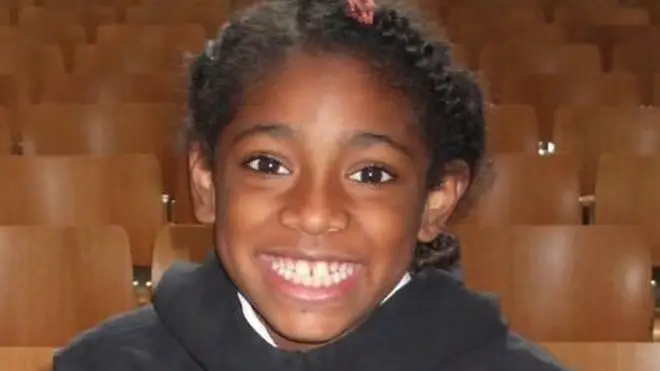
James O'Brien 10am - 1pm
7 December 2020, 16:48

The mother of a schoolgirl who died following an asthma attack has said she would have moved house immediately had she known how dangerous the levels of air pollution were.
Nine-year-old Ella Kissi-Debrah died in February 2013 after suffering numerous seizures and making almost 30 visits to hospital with breathing problems over three years.
An inquest at Southwark Coroner's Court is investigating whether dangerous levels of air pollution in Lewisham, south-east London, where she lived with her family, may have contributed to her death.
Speaking at the inquest on Monday, Rosamund Kissi-Debrah said better education about air pollution, which she called "a public health emergency", is needed.
READ MORE: Inquest to rule if illegal levels of air pollution killed London schoolgirl
"The only thing I could have done as her mother would have been to move," she said.
"We literally would have just moved because we were desperate - anything that could have helped.
"Moving would have been the first thing to do."
She added: "There seems to be a disconnect between medical and public health, so public health has all the information and medics don't.
"They need to work together much more closely and it's one of my aspirations to get public health and medical doctors together, and I think things will be much better.
"Do I think the population at large knows enough? No, I do not.”
Ella was taken to hospital in the early hours of February 15, 2013 but died at 3.27am.
Ms Kissi-Debrah, a teacher, said she and doctors had been "looking in completely the wrong direction" for the cause of her daughter's breathing difficulties.
"We didn't know because there was no rhyme or reason (for the episodes). She had them at home and she had them in hospital," she told the inquest.
She added that although she is now aware of the many air pollution monitoring websites, she believes most parents are not.
"There are 1.1 million children with asthma in this country, I am not convinced that if you did a survey with most of the parents that they would know about these websites," she said.
"(The information) is there, but it is not getting to the people that need to be gotten to," she said.
But Ms Kissi-Debrah added that measures introduced to improve air quality would have been too slow to help her daughter.
"People look at things in the long term, so they make decisions and say things like 'Oh, this will improve the air in about six or 12 months'," she said.
"What they do not realise is that if you have someone who is severely asthmatic, they do not have the time to wait.
"Someone like Ella, if she was alive now, she could not wait six or 12 months for initiatives to take hold."
She described her daughter as "the centre of our world" and said she had been extremely active despite her asthma, enjoying sports and playing several musical instruments.
"She was extremely healthy at birth, there were no complications," she said.
"She was extremely active, so that by the age of six months she was already in a swimming pool and at nine months we were going to the local gymnastics club."
Jocelyn Cockburn, Ms Kissi-Debrah's lawyer and friend of the family, said: "Despite the fact that air pollution has been recognised as a public health emergency the day-to-day impact of air pollution on the health of millions of people, including children, is still poorly understood even by the clinicians treating patients for conditions affected by air pollution
"If this inquest does one thing, it should ensure that this issue can no longer be overlooked."
The inquest continues.